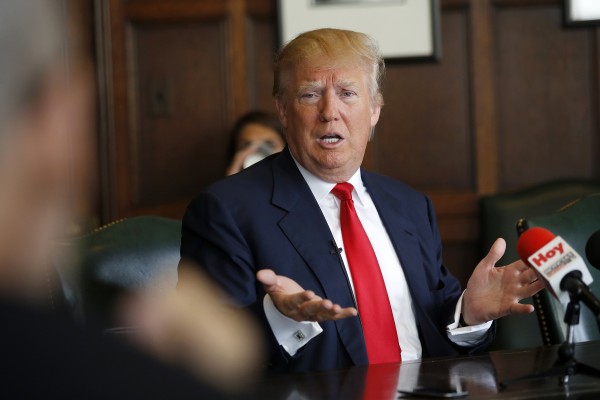Donald Trump: Are We Just Infatuated by Controversy?
TNS
Donald Trump speaks with the Chicago Tribune Editorial Board Monday, June 29, 2015 in Chicago. (Michael Tercha/Chicago Tribune/TNS)
August 28, 2015
At this point in the 2016 presidential race, there are almost 20 candidates vying for the Republican spot on the final ballot. One candidate, Donald Trump, has rekindled his fame and portrayed himself as more than just a blunt businessman. Recently, and especially during the Republican presidential primary debates on Aug. 6, Trump has made many statements concerning Hispanics, immigration, and women that have caused disturbances in both liberal and conservative households. Almost inexplicably to some, Trump was leading the Republican polls at 23 percent, with the runner-up, Ted Cruz, at 13 percent one day after the conclusion of the debate. Looking over Trump’s attitudes so far, the support for Trump seems to convey the Republican constituents’ need for change, both in America as a whole and within the party itself.
Within national politics, Trump sees himself as a harbinger of massive upheavals that still maintain a conservative slant. Trump is very vague in most of his interviews on the details of his ideas, but he is also more blunt than his fellow candidates in stating the general themes of what he wants to accomplish. Trump’s level of confidence also allows him to target specific individuals in government that he disapproves of, and voters are drawn to this. For example, in an interview with Sean Hannity of Fox News, Trump discussed Caroline Kennedy, the U.S. ambassador to Japan, and the topic of international trade. He said: “We don’t make good deals anymore. We have incompetent people—probably stupid—but incompetent people, they’re making deals. I look at Japan, and I see Caroline Kennedy, who is a very nice person. You know why I say she is nice? Because my daughter thinks she is nice, Ivanka. Anybody that Ivanka likes, I like. But that doesn’t mean I want her as our chief trade negotiator”. On a psychological level, these statements show a certain amount of strength. When some voters see a potential leader openly attacking another person in a position of power, it shows audacity and a lack of fear. The same basic principle is present when revolutionaries are unafraid of the consequences of speaking out against oppressive governments. Now, there is also certainly a feeling among Americans that change is needed, but change is one form of stimulation, and our country, permeated by electronic devices and social media, is addicted to stimulation. Donald Trump sparks people’s need for excitement with his devil-may-care attitude and his wealth. So though the situations are different, the need for change is the same, and subconsciously, Trump’s emotional force when speaking strengthens this desire on the part of the voters.
Indeed, Trump’s personality caters to the GOP voters’ desire for change within their party as well. Again, his blunt, harsh, unique and mostly shocking nature as a politician, business mogul and regular man is key. Of the Republican candidates in the past four elections, Mitt Romney, John McCain, and George W. Bush, all of them cultivated personas of respectable family men. Two of the three, McCain and Bush, served in the military. All three openly and proudly practice the Christian faith, which strengthens their family values. These qualities, combined with their high levels of education and their respected positions in the federal and state governments, transformed them into typical representations of what Republicans came to expect from their candidates. But now the voters are tired of the status quo, and when Trump denies the outward personas of his predecessors, voters see him as a man who can deliver results closer to their party’s goals. As portrayed in the media, he is much more the ruthless businessman than the father tending to a white picket fence. He does not come off as staunch, refined and educated, but rather as brash and egotistically proud of his success. The way he flaunts his wealth and mentions himself over and over again like a trumpeter giving praise to a King contradicts Romney discussing his time as a missionary, or McCain sharing memories of his days as a prisoner of war. In short, since Trump is so different from typical Republican candidates, party voters see him as more likely to rise as a national leader, since most of their recent candidates–all except Bush–have failed in doing so.
And thus, Trump’s surprising ability to lead at the polls can be explained. Though many analysts believe that he will not end up as the Republican candidate in 2016, other potential candidates should take note of how he has been able to reel in support thus far. They need to alter their strategies and become more specific about the issues that Trump remains vague on, especially international trade, immigration, and women’s health, in order to prove themselves worthy to bring about the political changes that Trump is making voters realize they need.










